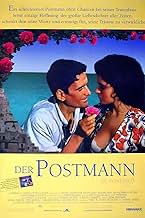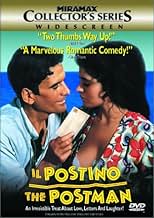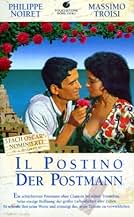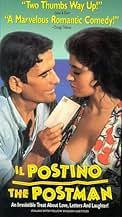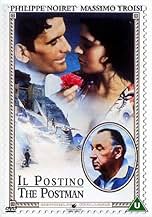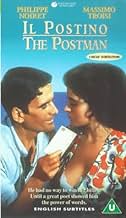ÉVALUATION IMDb
7,8/10
40 k
MA NOTE
Un facteur italien ordinaire apprend à aimer la poésie tout en livrant du courrier à un poète célèbre, puis l'utilise pour courtiser Béatrice, une beauté locale.Un facteur italien ordinaire apprend à aimer la poésie tout en livrant du courrier à un poète célèbre, puis l'utilise pour courtiser Béatrice, une beauté locale.Un facteur italien ordinaire apprend à aimer la poésie tout en livrant du courrier à un poète célèbre, puis l'utilise pour courtiser Béatrice, une beauté locale.
- A remporté 1 oscar
- 31 victoires et 20 nominations au total
Calogero Azzaretto
- Bookseller
- (uncredited)
Simona Caparrini
- Elsa Morante
- (uncredited)
Angelo Casadei
- Cinema Spectator
- (uncredited)
Chuck Riley
- Narrator of Theatrical Trailer
- (voice)
- (uncredited)
Histoire
Le saviez-vous
- AnecdotesWriter/co-director/star Massimo Troisi postponed heart surgery so he could complete the film. The day after filming was complete, he suffered a fatal heart attack.
- Citations
Mario Ruoppolo: Poetry doesn't belong to those who write it; it belongs to those who need it.
- Autres versionsThe Italian version of the film includes an additional title credit for Massimo Troisi, listed as co-director of the movie together with Michael Radford.
- ConnexionsEdited into Laggiù qualcuno mi ama (2023)
- Bandes originalesMadreselva
Written by Francisco Canaro (as F. Canaro) and Luis César Amadori (as L.C. Amadori)
Performed by Carlos Gardel
Courtesy of E. Musical Pirovano
Commentaire en vedette
Michael Radford, an English director, ought to be given credit for bringing this beautiful story to the screen. It speaks volumes that Mr. Radford achieves a triumph with a film that for all practical purposes should have been directed by an Italian. This is a timeless story of friendship, poetry and love set in a desolated island that was to be Pablo Neruda's home in exile.
The story is a simple one. Mario Ruoppolo, a poor man without a job, suddenly applies for a vacant position that will pay almost nothing, but by becoming a letter carrier he gets the chance of meeting a man that will make a deep impression on him and who will change his life completely.
Mario, the postman, is almost illiterate. He can read and write, with only the basic knowledge he probably picked up in the island school. He is allergic to fishing, and can't make a living like his father, and probably most of his ancestors before him. It's the time after WWII in which a poor Italy is still recovering from the devastation and defeat.
Pablo Neruda, the Chilean poet, finds a rustic home in the island. He is the most famous person ever to set foot in there. Mario is in charge for bringing Pablo his packages and mail. An easy friendship develops between them. Like everyone else in the island, Mario is impressed by the foreigner. In trying to imitate his poet friend, Mario awakens to all the beauty around him and discovers love with the gorgeous local girl, Beatrice Russo.
The film's mood changes right after Pablo Neruda and his wife receive assurances they can go back to their native land. This leaves Mario in a sad state, but now that he is married, he has other responsibilities to live for. Neruda had awakened in Mario a desire to speak for himself and to seek justice.
This is a film totally dominated by the late Italian actor Massimo Troisi, who as Mario, completely captures us by just being a simple soul with no malice. Mr. Troisi is splendid in his take of this poor man who discovers beauty and poetry late in his life. Philippe Noiret, is Pablo Neruda. Mr. Noiret makes a great contribution as the man who sees beauty everywhere and translates it into poetry. Maria Grazia Cucinotta is the beautiful Beatrice, the woman who loves Mario. Renato Scarpa and Linda Moretti, play minor roles with success.
"Il Postino" is helped by the magnificent cinematography of Franco di Giacomo who captures the island in all its splendor. The music score is another asset. Luis Bacalov's tuneful background music adds another layer in this film rich texture.
This film is an excellent way to be introduced to Pablo Neruda's poetry, even if it's only for the curiosity the film will give even a casual viewer. Thanks to Michael Radford for a poetic view of this lonely place where two people meet and are changed forever.
The story is a simple one. Mario Ruoppolo, a poor man without a job, suddenly applies for a vacant position that will pay almost nothing, but by becoming a letter carrier he gets the chance of meeting a man that will make a deep impression on him and who will change his life completely.
Mario, the postman, is almost illiterate. He can read and write, with only the basic knowledge he probably picked up in the island school. He is allergic to fishing, and can't make a living like his father, and probably most of his ancestors before him. It's the time after WWII in which a poor Italy is still recovering from the devastation and defeat.
Pablo Neruda, the Chilean poet, finds a rustic home in the island. He is the most famous person ever to set foot in there. Mario is in charge for bringing Pablo his packages and mail. An easy friendship develops between them. Like everyone else in the island, Mario is impressed by the foreigner. In trying to imitate his poet friend, Mario awakens to all the beauty around him and discovers love with the gorgeous local girl, Beatrice Russo.
The film's mood changes right after Pablo Neruda and his wife receive assurances they can go back to their native land. This leaves Mario in a sad state, but now that he is married, he has other responsibilities to live for. Neruda had awakened in Mario a desire to speak for himself and to seek justice.
This is a film totally dominated by the late Italian actor Massimo Troisi, who as Mario, completely captures us by just being a simple soul with no malice. Mr. Troisi is splendid in his take of this poor man who discovers beauty and poetry late in his life. Philippe Noiret, is Pablo Neruda. Mr. Noiret makes a great contribution as the man who sees beauty everywhere and translates it into poetry. Maria Grazia Cucinotta is the beautiful Beatrice, the woman who loves Mario. Renato Scarpa and Linda Moretti, play minor roles with success.
"Il Postino" is helped by the magnificent cinematography of Franco di Giacomo who captures the island in all its splendor. The music score is another asset. Luis Bacalov's tuneful background music adds another layer in this film rich texture.
This film is an excellent way to be introduced to Pablo Neruda's poetry, even if it's only for the curiosity the film will give even a casual viewer. Thanks to Michael Radford for a poetic view of this lonely place where two people meet and are changed forever.
- jotix100
- 7 juin 2005
- Lien permanent
Meilleurs choix
Connectez-vous pour évaluer et surveiller les recommandations personnalisées
Détails
- Date de sortie
- Pays d’origine
- Site officiel
- Langues
- Aussi connu sous le nom de
- Il Postino
- Lieux de tournage
- Pollara, Salina Island, Aeolian Islands, Messina, Sicily, Italie(rural and beach scenes)
- sociétés de production
- Consultez plus de crédits d'entreprise sur IMDbPro
Box-office
- Budget
- 3 000 000 $ US (estimation)
- Brut – États-Unis et Canada
- 21 848 932 $ US
- Fin de semaine d'ouverture – États-Unis et Canada
- 95 310 $ US
- 18 juin 1995
- Brut – à l'échelle mondiale
- 21 898 920 $ US
- Durée1 heure 48 minutes
- Couleur
- Mixage
- Rapport de forme
- 1.66 : 1
Contribuer à cette page
Suggérer une modification ou ajouter du contenu manquant





